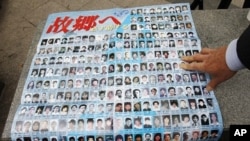North Korea is now acknowledging it is still holding two Japanese, as well as an American of Korean origin. VOA Correspondent Steve Herman in Seoul reports the cases pose complications for their governments, which have no diplomatic relations with Pyongyang.
The charges
On the Wednesday evening North Korean newscast, an announcer read a communiqué about the detention, in the port city of Rason, of three Japanese nationals on charges of drug trafficking and counterfeiting.
The trio, the announcer says, admitted its crimes and the gravity of the offenses. One man, Masaki Furuya, has already been expelled from the country. The communiqué says, however, the two others, Hidehiko Abe and Takumi Hirooka, will face trial stemming from their arrests on March 14.
Japan’s foreign ministry has had sparse comment, merely saying it is investigating the case.
North Korea is also holding an American citizen, identified as Jun Yong-su.
Former U.S. President Jimmy Carter, during a private visit to Pyongyang last week with several European elder statesmen, unsuccessfully attempted to secure Jun’s release.
Jun, alternatively described as a California businessman and a Christian minister based in China, was arrested last November and charged with unspecified crimes against North Korea. There have been reports he was involved in missionary work. Pyongyang considers
proselytizing a subversive measure aimed at undermining the government.
Jun appears to have entered North Korea legally. The U.S. State Department has provided few details, citing privacy rules, but has called repeatedly on Pyongyang to release the American citizen as a humanitarian gesture.
Harsh measures
But there are indications North Korea intends to deal harshly with the Korean-American.
Sources tell VOA News that envoys in North Korea have been told Jun may face espionage charges, for which the penalty is death.
Jun is the fifth American detained by North Korea in the past two years. Carter traveled to Pyongyang to arrange the release of one of them, while another former U.S. president, Bill Clinton, secured the freedom of two journalists.
In all of the cases, the Americans were put on trial before their release.
Bargaining chip
Analysts say North Korea typically attempts to use such detained foreigners as diplomatic bargaining chips.
Yoo Ho-yeol, professor of North Korean Studies at Korea University, notes Pyongyang usually does not hold on to such foreigners for very long.
But Professor Yoo says it is possible North Korea will now impose harsher penalties in such cases as part of a heightened crackdown against anti-regime attempts. He notes that after the foreigners are sentenced, Pyongyang typically accepts pleas from diplomats to free
them.
Securing release
In the new cases, the professor says, both the United States and Japan will need to work, albeit indirectly, with the North Korean government for the release of their citizens.
The cases are complicated by the fact that neither Washington nor Tokyo has diplomatic relations with Pyongyang.
Professor Yoo expects communications to be handled through the Swedish delegation in the North Korean capital.
Yoo says western diplomats based in North Korea, such as the Swedes, will monitor any trials, relay concerns about the conditions of the prisoners and negotiate for their eventual release.
North Korea, through trade zones, such as Rason, has been making attempts in recent years to engage foreign investors to boost its impoverished economy. But the communist state closely monitors them, looking for indications visitors could be engaged in missionary work, news-gathering, espionage or other activities perceived as potentially
undermining the authoritarian government.
Foreigners Held in North Korea Pose Diplomatic Challenge




